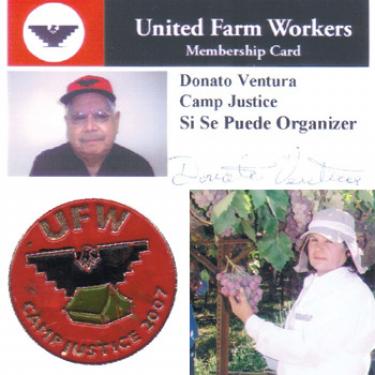
Clockwise, starting at top: Who is this man and why is his picture on this card? Elena Sanchez picks and packs delicious red table grapes. United Farm Workers union Camp Justice 2007 pin.
Camp Justice
Donato Ventura of Lake of the Woods is a retired community college career counselor and a former farm worker. For over forty years, he writes, he’s volunteered to work "alongside Cesar Chavez and Dolores Huerta." He is not a UFW employee but he and his wife, Mary, attended Camp Justice in August. This is his explanation of why they went this year.
By Donato Ventura
For three weeks 100 individuals recently camped at the United Farm Workers of America site called Forty Acres, near Delano. One of the objectives was to get the farm workers to sign a petition asking the governor to sign SB 180 into law. That law would make it easier for farm workers to join a union.
The other objective was to get workers to fill out and sign cards asking the United Farm Workers union to represent them in work contract negotiations. Once 10% of the workers in a particular company sign, an election can be held to determine if 50%-plus-one of the workers want the UFW to be their bargaining agent.
Under SB 180—passed by the assembly and the senate and awaiting the governor’s signature—when 50% of the workers in a particular ranch sign cards, the UFW would be authorized to negotiate a contract with the grower. Agribusiness and the state chamber of commerce oppose the law.
Ten of the largest grape growing companies in the San Joaquin Valley pay minimum wages, $7.50 to $7.75 per hour and no benefits.
This is not a living wage. What happens is the workers can’t support their families with what they earn and must rely on government programs such as food stamps, WIC, Section 8 subsidized housing, government hospital and other welfare programs. Taxpayers are stuck with paying what the grape growers should pay. Instead, the grape growers pocket the profits at taxpayer expense.
Workers with UFW contracts earn $9.50 to $15 per hour, with better working conditions, medical insurance for the worker and his family, a pension plan, paid vacations and holidays. The worker can pay his own way.
Many non-farm workers interviewed said they’d be willing to pay a little extra for fruits and vegetables, rather than pay for the government programs mentioned above. Those interviewed said the grape growers should pay a living wage or face a boycott of their products. Growers are pocketing the profits they should share with the workers.
OPINION by Donato Ventura: Deportation Would Be a Disaster
The points I make in this report are truly before us in many ways, not only because of the underpaid farm worker; but because of the controversy over undocumented immigrants– illegal aliens.
There is a frenzy of uninformed data relating to the undocumented resident with proposals to not give undocumented workers government services. If the 12 million or so undocumented residents were deported, it would be disasterous to our economy.
This is part of the September 28, 2007 online edition of The Mountain Enterprise.
Have an opinion on this matter? We'd like to hear from you.


